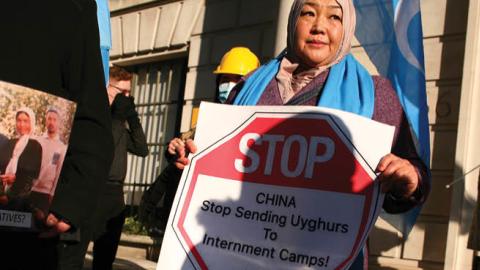Acts of genocide are currently underway against the Uyghur people in the Xinjiang Uyghur Autonomous Region of northwestern China, also known as East Turkistan. As part of a campaign of persecution and cultural eradication, Chinese authorities have, according to former detainees and prisoners, subjected millions of Uyghurs and other minorities to rape, torture, forced labor, arbitrary detention, involuntary abortion and sterilization in state-run facilities, and the separation of around half a million Uyghur children from their families.
Although both Republicans and Democrats in the United States have acknowledged these horrifying acts as genocide, the rest of the world has been slow to follow, whether because they find the evidence to be inconclusive or because they are reluctant to antagonize China. Regardless, now that the Biden administration is on record declaring the actions of the Chinese government to be genocide, the United States has a legal and moral obligation to do what it can to end the mass atrocities that the Chinese Communist Party (CCP) is committing against the Uyghur people.
While both the Trump and Biden administrations and Congress have already taken steps to address this human rights disaster, more can and should be done to defend the Uyghur people, address their humanitarian needs, promote accountability, and ensure that individuals and entities within the United States—including private businesses—are not complicit in the abuses underway. A strong response to the ongoing genocidal campaign would send a powerful message to Beijing that America will not tolerate efforts to destroy ethno-religious groups, either as a whole or in part. Conversely, failure to act would render the Convention on the Prevention and Punishment of the Crime of Genocide (which the United States ratified in 1988) and its implementing legislation null and void. Through the three Cs—competition, confrontation, and cooperation—the Biden administration can act in coordination with US friends and allies abroad to end these atrocities.
The Biden administration is now on record as recognizing this repressive campaign as genocide, a move that must trigger a response toward Beijing that departs from business as usual. Although China’s significant global influence supports the assumption that effective levers to influence its behavior with respect to human rights issues are lacking, international attention and pressure have already caused Beijing to backpedal to a certain degree. This attention and pressure resulted from US-led efforts to rally international support coupled with US legislative and executive responses, including sanctions, visa restrictions, and trade restrictions.
This policy memo outlines the nine areas of action that, performed in coordination with complementary actions of partners and allies, could alleviate the Uyghur human rights crisis, pressure China to reverse course, and ensure that the West and corporate America are not complicit in genocide.


















